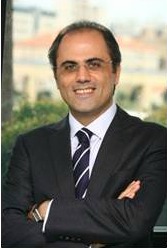

10:00 pm AST - 10:45 pm AST
Past Event
Content from the Brookings Doha Center is now archived. In September 2021, after 14 years of impactful partnership, Brookings and the Brookings Doha Center announced that they were ending their affiliation. The Brookings Doha Center is now the Middle East Council on Global Affairs, a separate public policy institution based in Qatar.
The Brookings Doha Center (BDC) and the International Monetary Fund (IMF) jointly organized a virtual fireside chat between Jihad Azour, director of the Middle East and Central Asia Department at the IMF, and Tarik Yousef, senior fellow and director of BDC, on May 5, 2021 to discuss the IMF’s latest Regional Economic Outlook for the Middle East. The discussion outlined the Middle East and North Africa (MENA) region’s post-pandemic prospects and the necessary steps for effective policy implementation to safeguard transformations, reforms, and more robust economic recoveries.
The speakers began the chat by pointing out that across the world, vaccination campaigns were ramping up and, despite the persistent threat of new COVID-19 variants or the potential for new waves forcing shut-downs, there has been a palpable sense that this year was the beginning of a much-anticipated recovery and adaptation period. The same scenario applies to the MENA region. However, the paths to recovery across the region will likely diverge since wealthier states with better policy planning, implementation and monitoring frameworks were able to respond faster and more comprehensively than their poorer neighbors. For the region as a whole to emerge from the pandemic, it is crucial for all countries to secure sufficient vaccine quantities and ensure their equitable distribution, alongside critical support for public health care.
According to the IMF, accelerating vaccinations and making necessary adjustments, given rising public debt and fiscal pressure, could contribute as much as 1 percent to the regional Gross Domestic Product (GDP) by 2022. It is therefore imperative that the MENA region, not only deals with ramping up vaccinations and making important policy adjustments, but to do so in an inclusive, and sustainable way, while taking advantage of new opportunities for greater regional and international cooperation.
Tarik Yousef pointed out that regionally, the pathway out of crisis, towards recovery was becoming clearer. Economic growth is expected to exceed earlier expectations even if the recovery takes longer. The IMF believes that 2021 is the year of transformation; the lull in economic activity provided a more accurate picture of existing economic vulnerabilities, justifying regional transformations toward newer, more resilient, and sustainable economic models.
Jihad Azour added that individual countries, however, might still suffer from inequitable vaccine distribution and inadequate social safety nets. As a result, some countries may not see positive changes until 2023, while wealthier and more responsive states will see faster recoveries, with the exception of high-contact sectors like tourism. Regardless, countries must enact comprehensive and well-coordinated policies and programs, with equitable vaccine access at their core, to avoid dangerous gaps appearing between population sectors, which will only prolong as well as complicate pandemic recovery efforts.
Azour explained that public policy has played an important role in guiding populations through the COVID-19 crisis and charting pathways to recovery. Surprisingly, some countries suffering from instability and/or insecurity have fared better than more advanced democracies via a combination of policies and actions crafted to ‘protect’ the public and contain the pandemic. Other countries have focused on ensuring access to adequate safety nets for the vulnerable, which has proven essential to mounting faster recoveries especially when combined with rapid vaccine uptake and other whole-of-society interventions.
The speakers then discussed the uncertain road ahead for the region. As public debt rises, while reduced economic activity negatively impacts fiscal revenues, poorer countries will find it more challenging to find the right timing or policy space when it comes to withdrawing critical support for the economy, public health care, targeted pandemic responses, and subsidies for the vulnerable. Countries must be patient in and must continue to absorb the crisis, adapt to new challenges and not lose sight of the importance of accelerated vaccination campaigns. Despite the crises, there are still opportunities to create value that do not rely on public spending such as revisiting priorities, curbing wasteful spending, and better targeting crucial sectors to safeguard the recovery.
Azour concluded by explaining the role of the IMF in the region when it comes to addressing the economic repercussions of the pandemic. The institution has made some $17 billion available to region. It has also activated frameworks for policy cooperation, connecting countries that do not need funding or aid with those that do. New special drawing rights (SDRs) policies will also go a long way toward addressing the needs of countries struck by COVID-19 whilst in the middle of implementing economic reforms. The Fund is also working closely with civil society organization, think tanks, and other institutions to better address the needs of the region’s most vulnerable populations. Additionally, the IMF is working to address concerns about rising public debt, while alleviating difficulties in implementing effective, expansionary fiscal and monetary policies given pandemic-induced constraints.


Noha Aboueldahab
August 23, 2021

August 23, 2021

Yasmina Abouzzohour
August 19, 2021